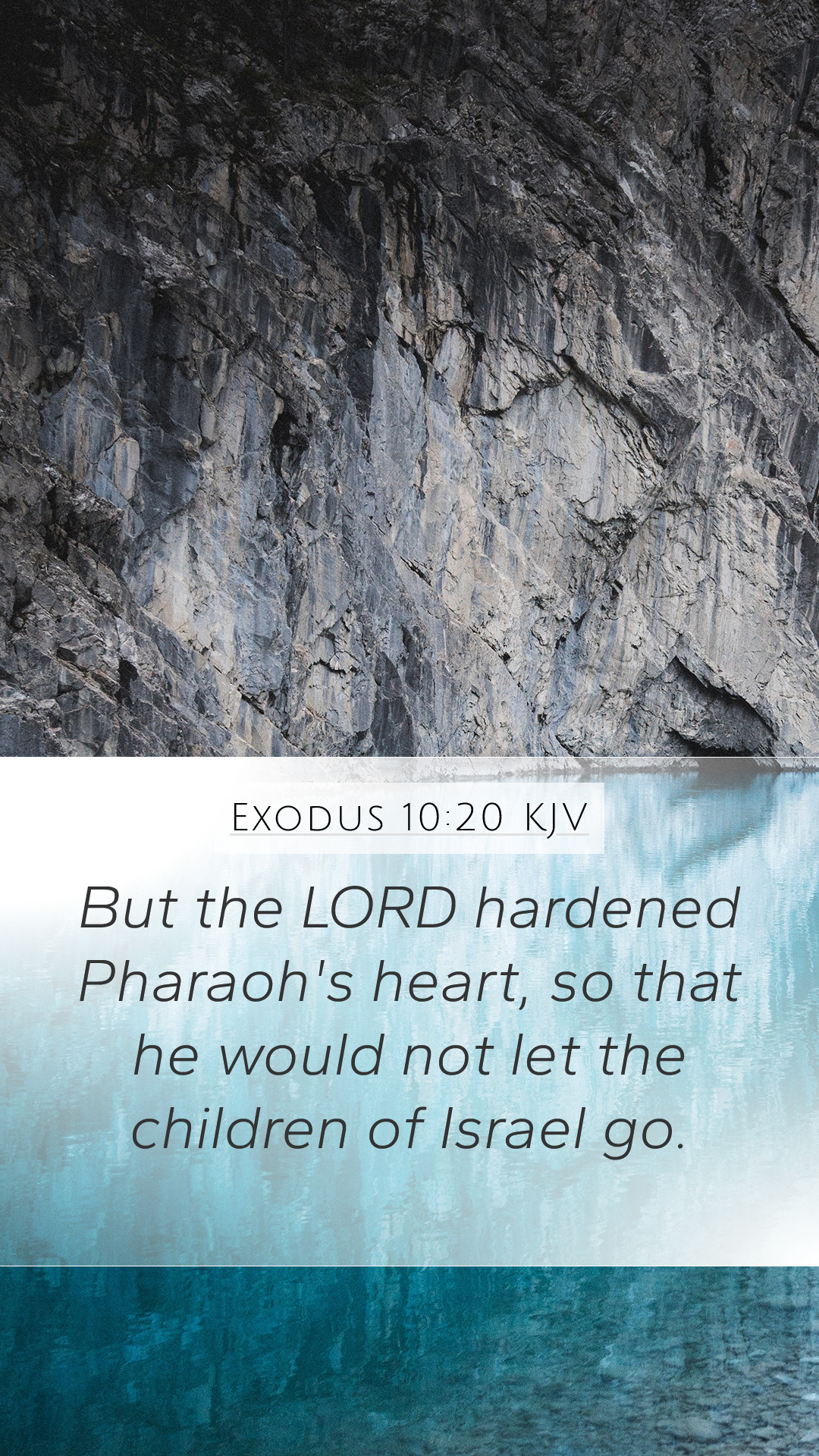Understanding Exodus 10:20
The Bible verse Exodus 10:20 states: "But the LORD hardened Pharaoh's heart, so that he would not let the children of Israel go." This verse is pivotal in the narrative of the Exodus and serves as a profound reference for exploring themes of divine sovereignty and human free will.
Bible Verse Commentary
Commentaries from respected theologians provide a deeper understanding of this verse:
- Matthew Henry: Henry emphasizes that the hardening of Pharaoh's heart is part of a larger covenantal narrative, demonstrating God's power over nations and rulers. He posits that this act serves to display God's justice and mercy, allowing for an opportunity for repentance that Pharaoh ultimately rejects.
- Albert Barnes: Barnes interprets the hardening of Pharaoh's heart not merely as a unilateral action by God, but as a key component in Pharaoh's own obstinacy. He argues that God’s hardening of the heart represents a divine response that occurs after Pharaoh has repeatedly hardened his own heart against the signs and wonders presented by Moses.
- Adam Clarke: Clarke explains that the hardening of Pharaoh's heart serves a dual purpose: it is both an act of divine judgement and a demonstration of God's ultimate authority. Clarke notes the significance of willful disobedience and highlights how God’s interventions in history exemplify a larger plan for the Israelite people.
Theological Insights
This verse invites theological reflection on various themes:
- Divine Sovereignty: It illustrates God's supreme authority over human affairs, particularly the rulers of Egypt.
- Free Will vs. Predestination: A key debate arises around the tension between God's control and human agency, particularly as Pharaoh repeatedly chooses to resist God’s commands.
- Judgment and Mercy: The hardening of Pharaoh’s heart serves as a warning about the consequences of rebellion against divine authority while also subtly pointing to the possibilities of grace and redemption.
Practical Applications
In applying this verse to daily life, consider these lessons:
- Recognizing Resistance: Individuals often face situations where they might harden their own hearts against truth or moral imperatives. Self-reflection can guide one to openness rather than stubbornness.
- The Importance of Obedience: Like Pharaoh, failing to heed the warnings of God can lead to dire consequences. Obedience fosters a richer spiritual life.
- Understanding God’s Justice: This verse serves as a reminder that divine justice is often inscrutable but ultimately fair; hence, believers should be mindful of their choices.
Scripture Analysis
In the context of Scripture, Exodus 10:20 is significant for its place in the larger narrative of the Exodus story, contributing to the understanding of Israel's plight and the overarching theme of deliverance from bondage. The passage also resonates with numerous other texts, underscoring the consistent message found throughout the Bible regarding God's authority.
Bible Cross References
To further enrich your study of Exodus 10:20, consider these related verses:
- Exodus 7:3: "And I will harden Pharaoh's heart..." — this introduces the theme of God's authority over Pharaoh.
- Romans 9:17: "For the Scripture says to Pharaoh: 'I raised you up for this very purpose...'" — this highlights God's sovereign purpose in hardening hearts.
- 2 Thessalonians 2:11-12: "For this reason, God sends them a powerful delusion..." — echoes the theme of God allowing hearts to be hardened in judgment.
Conclusion
In summary, Exodus 10:20 serves as a rich verse for deep Bible study insights, exploring the complex interplay between God's sovereignty and human choice. Understanding this verse can provide clarity on the nature of resistance against divine authority and the implications it has for personal faith journeys.
This analysis also contributes significantly to understanding difficult Bible passages and interpreting biblical narratives in context, making it a valuable resource for Bible study groups, online Bible study platforms, and anyone seeking to enrich their understanding of scripture.


